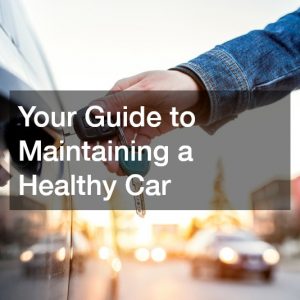Auto accidents can happen at any time, and being prepared for them can make a big difference in the outcome of the situation. Here we’re discussing ways to prepare for an accident before it occurs and minimizing the negative impact on your life and well-being.

What is the importance of being prepared for an accident?
It is important to be prepared for an accident before it happens to ensure that you can handle the situation effectively and minimize any potential harm. It’s not that hard though, so don’t stress! It’s as simple as 1) having a plan in place, 2) acting quickly, 3) an emergency contact list.
Having a plan means, knowing the first things you need to do when an accident occurs. Get documentation from the other parties involved, take pictures of everything (pictures are free with cellphones so take as many as you can stand to take), contact your car insurance company to get the claim process started (even if it is not your fault). From there, your insurance team will tell you if you need to find additional support for medical reasons (if your injuries are minor, hopefully an ambulance is there if they are not!) or a car accident attorney for the legal decisions that need to be made by you and the other parties involved in the car accident.
Of course, this all starts with trying to avoid an accident in the first place. Try to avoid driving in inclement weather, high traffic, or low-light situations when accidents are more prone to occur (according to the NSC). Those are all hard to control, but you can control how you behave in those situations; understanding the risks involved in driving in a particular situation (e.g., it’s raining) and adjusting how/what you do when driving can be a great way to avoid accidents. It’s seems simple to say, “when it’s raining you should slow down,” but we all forget these things and a reminder each time is important to reducing accidents at a national level. By being aware of potential hazards, you can take proactive steps to mitigate them and reduce the likelihood of an accident occurring.
All of that said, there’s still a chance that you’re going to get into a car crash at least once in your life (we hope that it is minor). When that happens you’re going to have to explore a world of decisions and the first of those decisions is what type of auto shops you think are the best to work on your car. Of course this decision is not as simple as going to the first shop that your parents recommend to you, you need to consider the style of car you are (were) driving.

Different Strategies for Different Car Types
Ok, so the accident has happened. You’ve been unable to avoid an accident and now you are on the side of the road (hopefully it is not raining) figuring out what to do with your insurance company on the phone and your lawyer texting you questions. What is the best local auto body shop to take your car and get the work started? You want it fast, but you also want it done correctly, right? Well, it depends on your car. We like to think of a car mechanic like a car doctor. If you had a problem with your eyes you wouldn’t go to the podiatrist, right? You’d go to the eye doctor (ophthalmologist). Cars are the same way.
For European cars like an Audi (German car company), it is recommended to have a reliable European car repair services provider in case of any collision or repairs needed. European cars often have specific parts that need to be specially ordered from the EU manufacturing facility or parts that are measured in different measurement systems or even in different languages! If there’s a mechanic that is working on your German-made car, you don’t need them to read/understand the German language but you need them to read/understand how to work on a German car. There’s a higher chance of getting your car repaired after an accident much more successfully if that Audi is being work on by a Audi repair shop than a Honda repair shop.
For truck repair, the same is true. A BMW or Lamborghini repair shop knows everything about working on a “high performance race car,” but what do they know about making sure there is towing capacity after the truck repairs are complete? Not much. When getting your truck repaired after a truck accident, you want a shop that understands how to straighten the truck bed or re-attach a snow plow, etc. Not least of all, you just want them to have the correct parts so you don’t have to wait on the ordering of custom parts. Go with a truck repair shop that has F150s, Tacomas, Silverado in the parking lot. Then you’ll know they work on lost of trucks and can have the right parts for the right brands.
The worst is if If you own a classic car and are finding yourself in a classic car wreck (*tear*). Classic car collision repairs by far are the most specialized. For trucks, cars, even exotic race cars, there is likely an availability of parts and knowledge that many shops in your local market can support you. For classic cars, you’re likely going to have to travel to a new market to find a shop that specializes in manufacturing parts or has a huge supply of classic parts from years past. Classic cars are usually not the everyday car of their owners, so find the right classic car shop to fix your car is better than trying to do a “rush job” with a shop that doesn’t specialize in classic cars. Even if that means getting on a waiting list and waiting some time, it’s better than getting the job done incorrectly and having to fix a set of mistakes.

What steps can I take to prevent accidents from happening?
While accidents are unpredictable, there are steps you can take to minimize the risk of them occurring or the damage the accident can do to your body or your car’s body. Implementing safety measures, such as using seat belts and avoiding distractions while driving, can significantly reduce the chances of accidents.
Proper maintenance of equipment and vehicles is also key to preventing accidents. It makes sense that you need to check your tires for the appropriate tire pressure (most cars have automatic tire pressure sensors these days) or check the brake or transmission fluid levels, but what about checking windshield wiper fluids or checking your exhaust system for much needed muffler repairs? Those could seem like innocuous things, but both could lead to accidents. For example, imagine driving in the snow with no windshield wiper fluid to clear your windshield. Or imagine driving down the street with a muffler leaking harmful gas into the car? Both are accidents waiting to happen. Regularly servicing your car, checking for any issues, and addressing them promptly can help avoid breakdowns or malfunctions that could lead to accidents.
Following safety guidelines and protocols, such as obeying traffic laws and speed limits, can also contribute to accident prevention. Proper training for yourself and others who may drive your car is essential to ensure they understand how to operate the vehicle safely.
How can I prepare financially for an accident?
Financial preparedness is crucial when it comes to dealing with the aftermath of an accident. Building an emergency fund can provide you with the resources needed to cover unexpected expenses resulting from an accident.
Reviewing your insurance coverage regularly and updating it as needed can ensure you have adequate protection in case of an accident. Establishing a healthcare plan can help cover medical expenses if you or anyone involved in the accident sustains injuries.
Consulting a financial advisor to discuss your options and create a budget for unexpected expenses can provide you with peace of mind and financial stability in the event of an accident.
What should I include in an emergency car crash kit?
Having an emergency car crash kit can be a lifesaver in the event of an accident or any other emergency situation. Make sure your kit includes essential items such as first aid supplies, non-perishable food, water, flashlights, and blankets (especially as we get into winter and the temperatures drop around the country). Also, having important documents and contact information readily available in your kit can help you navigate the aftermath of an accident more effectively. Tools and personal hygiene items can also come in handy during emergencies and should be included in your kit. Being prepared with a well-stocked emergency kit can make a significant difference in how you cope with the aftermath of an accident and ensure you have the essentials needed to stay safe and comfortable.
As a side note, not mentioned often, is what to do when an accident occurs in a rural setting with no access to tow trucks or emergency vehicles. In those situations, it is important to remember that you might have to deal with the accident yourself. Having a plan with a neighbor or friend and a shared aluminum car hauler will allow you to do your own accident clean up after a car crash. In the event of an accident, you can have a “car clean up pact” with a friend, call that friend, pick up the car hauler with a truck (let’s hope it isn’t your truck in the wreck), and haul your wreck off the side of the road. Depending on your location this can be cheaper than asking a tow truck to haul it to a local repair shop and certainly a lot faster. If you fancy yourself a car junky, you could also haul the car home and start working on it yourself to save the maximum amount of money (be sure to document for your car insurance provider!).
How can I stay calm and focused during an emergency situation?
Remaining calm and focused during an emergency is crucial for making sound decisions and taking appropriate actions. Practicing mindfulness and breathing techniques can help reduce stress and keep you centered in high-pressure situations.
Prioritizing tasks and decision-making can help you focus on what needs to be done first and avoid feeling overwhelmed. Effective communication with others involved in the accident can ensure everyone is on the same page and working towards a common goal.
If you feel overwhelmed or unsure of what to do, don’t hesitate to seek help from emergency services or professionals who can assist you. Following your emergency plan and learning from past experiences can also improve your ability to stay calm and focused during emergencies. Preparing for accidents should be an ongoing effort to ensure you are always ready for unexpected events. Regularly reviewing and updating your emergency plans can help you stay prepared for any situation that may arise.
Participating in ongoing training and education related to safety and emergency preparedness can enhance your skills and knowledge in handling accidents effectively. Monitoring potential risks and hazards in your environment can help you proactively address them before they lead to accidents.
Engaging in community preparedness activities and networking with professionals in relevant fields can provide you with resources and support in the event of an accident. Taking care of your physical and mental well-being can increase your resilience and ability to cope with emergencies over the long term.
Conclusion
Being prepared for accidents before they occur is essential for ensuring your safety and well-being in any emergency situation. By following the steps outlined in this article, you can proactively prepare for accidents and minimize their negative impact on your life. Remember, preparation is key to staying safe and secure in the face of unexpected events. Stay informed, stay prepared, and stay safe!





